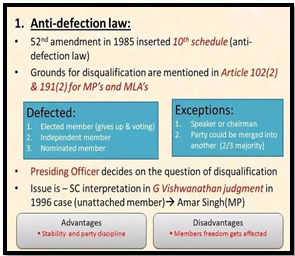UNDERSTANDING THE ‘TENTH SCHEDULE’
Why in the News?
- The Maharashtra Assembly Speaker declined to disqualify 40 MLAs from the Eknath Shinde faction and 14 MLAs from the Uddhav Balasaheb Thackeray (UBT) group.
- Recognition of the Shinde faction as the legitimate Shiv Sena and valid appointment of whip led to this decision.
Source: UGI
About Tenth Schedule or Anti-Defection Law :
- Enacted as the Tenth Schedule in 1985 to curb defections among Members of Parliament (MPs)/Members of the Legislative Assembly (MLAs).
- Aimed at stabilizing governments by discouraging party-hopping.
- Legislative Addition:
- Integrated into the Constitution via the 52nd Amendment Act, 1985.
- Addresses disqualification of elected members for defection to another party.
- Response to state government topples post-1967 general elections.
- Group Dynamics :
- Allows group MP/MLAs to merge with another party without individual penalty.
- Doesn’t penalize parties for encouraging or accepting defections.
- Amendments: Originally considered one-third defection as a ‘merger,’ changed to two-thirds by the 91st Constitutional Amendment Act, 2003.
- Disqualification and Election Standing:
- Disqualified members can contest elections from any party for a seat in the same House.
- Decision on defection referred to the Chairman or Speaker, subject to judicial review.
- No specified timeframe for presiding officers to decide on a defection case.
- Grounds for Defection:
- Voluntarily giving up party membership.
- Voting against party directives without prior permission.
- Independent elected members joining a political party.
- Nominated members joining a political party after six months.

 Source: UGI
Source: UGI


